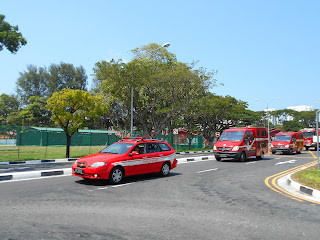http://mashable.com/2016/03/22/belgium-brussels-attacks-security-vulnerable/#YLx3UvHEfmqE
http://www.irishtimes.com/opinion/brussels-attacks-belgian-intelligence-service-seen-as-weak-link-in-europe-1.2583514
http://www.haaretz.com/world-news/.premium-1.710572
The theme of weak Belgian
domestic intelligence and security is a tired old one. It's probably not a mere
scapegoat, since people have been warning about it long enough before this.
(Since after the Paris attacks, actually.)
I don't understand
their domestic context and history enough to analyze it properly. Instead, what
came to mind was the thought that any organization ought to prepare for
after-action reviews following such incidents, because there are always unknown
unknowns. These sorts of things can be easily convened, but it would be better
for all stakeholders if the details are discreetly sorted out - for example,
how to manage the PR during a public hearing.
More importantly, the
paradigm of vaguely-ISIS-inspired opportunistic attacks on nations (Australia,
the US, France, Indonesia, now Belgium) is distressing but honestly
counterproductive.
They do not strike at
anyone's centre of gravity. The world at large retains the ability to do
serious damage to ISIS-held lands and sympathizers (or simply prolong the war
in Syria), no matter if it's accomplished by the US, EU, the Saudi coalition,
or even Russia. If political considerations are overridden, this could be
easily done.
Despite the mayhem,
these attacks are tactical victories at best and don't do much except raise the
stakes. Ideally, terror strikes would be targeted against enemy nations'
centers of gravity to hurt them; instead we have violence for violence's sake.
(Without some sort of central command, these terrorists are more similar to
criminals/extremely violent franchises of a street gang rather than soldiers.)
My argument will fall,
however, if the targets are willing to accept/are sensitized to a new normality
of occasional attacks, which is still possible!
It would be more productive to examine whether the tempo is increasing in response to the extreme pressure on ISIS in Syria, or perhaps the seeds planted in these men some years back bearing fruit. Or this Brussels attack could be an anomaly in response to the recent crackdown.
Regarding centers of gravity that are actually affected, it's possible that one centre of gravity is to stoke racial tensions and widen the war. However, to prove this, one would need to demonstrate that the terrorists or their spiritual leaders are actually thinking in such terms, and are welcoming more battle.It would be more productive to examine whether the tempo is increasing in response to the extreme pressure on ISIS in Syria, or perhaps the seeds planted in these men some years back bearing fruit. Or this Brussels attack could be an anomaly in response to the recent crackdown.
P.S.: Thank you for
returning after my long hiatus - I recently began full-time employment, which changed my
situation rather drastically. I do hope to continue to share my thoughts in a
more focused manner.











